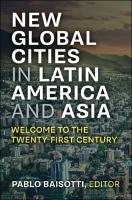New Global Cities in Latin America and Asia
External Review of Whole Manuscript
Welcome to the Twenty-First Century
Contributor(s)
Baisotti, Pablo (editor)
Collection
Knowledge Unlatched (KU)Language
EnglishAbstract
New Global Cities in Latin America and Asia: Welcome to the Twenty-First Century proposes new visions of global cities and regions historically considered “secondary” in the international context. The arguments are not only based on material progress made by these metropolises, but also on the growing social difficulties experienced (e.g., organized crime, drug trafficking, slums, economic inequalities). The book illustrates the growth of cities according to these problems arising from the modernity of the new century, comparing Latin American and Asian cities.
This book analyzes the complex relationships within cities through an interdisciplinary approach, complementing other research and challenging orthodox views on global cities. At the same time, the book provides new theoretical and methodological tools to understand the progress of “Third World” cities and the way of understanding “globality” in the 21st century by confronting the traditional views with which global cities were appreciated since the 1980s. Pablo Baisotti brings together researchers from various fields who provide new interpretative keys to certain cities in Latin America and Asia.
Keywords
Global Cities, Latin America, Asia, Mexico, Peru, Argentina, China, global violence, Singapore, Querétaro, Congqing, Bajío-Region, Chile, Santiago de Chile, Inequalities, Organized Crime, Slums, economic inequalities, modernity, twenty first century, Globalization, Urbanization, societyDOI
10.3998/mpub.12105185ISBN
9780472075232, 9780472055234, 9780472129973, 9780472902743Publisher
University of Michigan PressPublisher website
https://www.press.umich.edu/Publication date and place
Ann Arbor, 2022Grantor
Classification
Politics and government
Urban and municipal planning and policy
Urban communities


 Download
Download